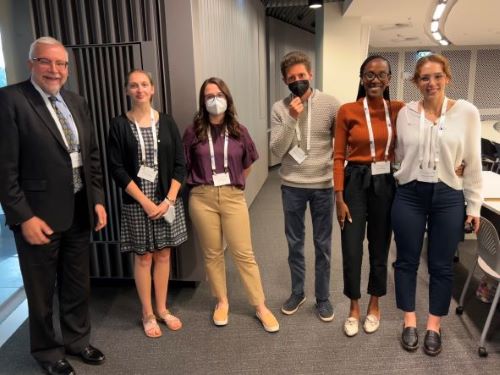Since 2015, The University of Maryland Environmental Law Program has served as the secretariate for the IUCN Academy of Environmental Law. The IUCN Academy of Environmental Law is uniquely positioned in building environmental law education capacity and promoting the conceptual development of environmental law world wide with members from over 200 educational institutions located in more than 60 countries. The IUCN Academy of Environmental Law held its 19th Annual Colloquium in Brisbane Australia July 11-15, 2022 after a three-year hiatus from in-person meetings (2021 the Colloquium was on-line). Prof. Bob Percival led a group of five Fedder Scholars to the Colloquium, the largest contingent of students from any University. Our five Fedder Scholars gave outstanding presentations on a wide range of environmental topics:
Nico Sarbanes presentation, Sources of Local Opposition to Wind Energy and Recommendations for Promoting Acceptance, focused on the legal and social challenges of siting wind turbine farms around the world. The common thread throughout is the lack of transparency and local community engagement in developing such projects, often accompanied by a lack of local benefits.
Eunice Kabuga gave a presentation on the Impact of Corruption on Environmental Policies in Africa detailing the importance on the rule of law for emerging environmental governance structures in some African countries. Eunice’s presentation highlighted the wide range of effective governance throughout the African continent with some countries doing poorly in corruption matrices, while others were doing quite well and linking those measures to environmental governance effectiveness.
Ashleigh Pagano’s presentation The Grand Ethiopian Renaissance Dam - A New Beginning for International Environmental Agreements outlined the history of water rights and disputes along the Nile River, focused primarily on Egypt, Sudan and Ethiopia, the challenges and importance of the Grand Ethiopian Dam to these countries and the negotiations to develop an international agreement governing water rights. Ashleigh analyzed elements of several international agreements in her recommendations for a binding agreement that will reduce conflict and equitably share water in one of the most important river basins in the world.
Paige Bellamy presented Free, prior informed consent and extractive industry: Indigenous action is the past, present, and future of global environmental justice that analyzed numerous extractive industry projects, the historic lack of free prior informed consent (FPIC), and its limited use today and the impact on indigenous communities. Tying this history into the current rise in environmental justice, both in the United States and abroad, Paige’s presentation focused on the need to obtain true consent (rather than just consultation) for future extractive industry projects that affect indigenous communities land, water and cultural rights.
Kennedi Fichtel’s presentation A cross national comparison of standing requirements and their effects on environmental litigation analyzed legal requirements to bring environmental lawsuits in the United States, the European Union, Australia, Uganda, and India , emphasizing the importance of such requirements that can bar citizens from opposing environmental degradation in court. Kennedi’s assessment showed the link between countries that recognize expanded environmental rights, such as a citizen’s “right to a healthy environment,” and expanded citizen access to courts to challenge environmentally harmful decisions.
Kennedi Fichtel said “The IUCN Colloquium was the single best opportunity I received during law school. Traveling to Australia to present on global environmental law issues allowed me to participate in a broader conversation about international environmental issues that I never thought I would get the opportunity to partake in. I met lifelong friends, I discussed international constitutional law with international citizens, and I had the experience of a lifetime. I would do it all again if given the opportunity, and I plan to get involved with the Academy as I progress in my environmental law career. I could not be more grateful for Professor Percival in providing us this opportunity.” We are looking forward to taking our next group of Fedder Scholars to the 2023 colloquium which will be held in Finland.

